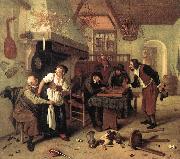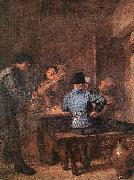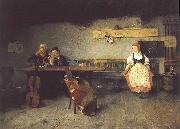Wholesale Oil Painting Reproductions No Minimum and Door to Door! |
|||||||||||
|
|
|||||||||||

|
|||||||||||
|
|
|
||||||||
All Jan Steen Oil Paintings |
||||||||
|
|
||||||||
|
|
||||||||
|
Artist Introduction: Dutch Baroque Era Painter, ca.1625-1679
Daily life was Jan Steen's main pictorial theme. Many of the genre scenes he portrayed are lively to the point of chaos and lustfulness, even so much that a Jan Steen household, meaning a messy scene, became a Dutch proverb (een huishouden van Jan Steen). Subtle hints in his paintings seem to suggest that Steen meant to warn the viewer rather than invite him to copy this behaviour. Many of Steen's paintings bear references to old Dutch proverbs or literature. He often used members of his family as models. Jan Steen painted also quite a few self-portraits, in which he showed no tendency of vanity.
Steen did not shy from other themes: he painted historical, mythological and religious scenes, portraits, still lifes and natural scenes. His portraits of children are famous. He is also well known for his mastery of light and attention to detail, most notably in textiles. Steen was prolific, producing about 800 paintings, of which roughly 350 survive.
Steen's work was valued much by contemporaries and as a result he was reasonably well paid for his work. He did not have any students, but his work proved a source of inspiration for many painters. |
||||||||
|
|
||||||||
|
In the Tavern Painting ID:: 32692 |
1660s
Oil on canvas, 63 x 69,5 cm |
|||||||
Height Width |
INS/CM Quality |
|||||||
|
X |
| |||||||
|
|
||||||||
All Adriaen Brouwer Oil Paintings |
||||||||
|
|
||||||||
|
|
||||||||
|
Artist Introduction: (1605 - January 1638) was a Flemish genre painter active in Flanders and the Dutch Republic in the seventeenth century.
At a young age Brouwer, probably born as Adriaen de Brauwer in Oudenaarde, moved perhaps via Antwerp to Haarlem, where he became a student of Frans Hals alongside Adriaen van Ostade. He also was active in stage acting and poetry. He stayed in Haarlem and Amsterdam until 1631, when he moved back to Antwerp in the Spanish Netherlands. There, he became a member of the Guild of St. Luke in 1631-1632, as well as the rhetoricians's chamber De Violieren.
Tradition has it that Brouwer himself spent much time in the alehouses of Flanders and Holland. His works are typically detailed and small, and often adopt themes of debauchery, drunkenness and foolishness in order to explore human emotions, expressions and responses to pain, fear and the senses. The Bitter Tonic is an example of the type of work that depicts such responses, in this case the sense of taste. His work was well liked, to the point that forgeries were sold in his own time. Both Rubens and Rembrandt owned a number of his works. Nevertheless, Brouwer appeared in financial trouble throughout his life.
He died at the early age of 32 in Antwerp, where he was first buried in a common grave. |
||||||||
|
|
||||||||
|
|
In the Tavern Painting ID:: 88551 |
first half of 17th century
Medium Oil on wood
cyf |
||||||
Height Width |
INS/CM Quality |
|||||||
|
X |
| |||||||
|
|
||||||||
All Simon Hollosy Oil Paintings |
||||||||
|
|
||||||||
|
|
||||||||
|
Artist Introduction: 1857-1918
Hungarian Simon Hollosy Gallery
Simon Hollosy (Romanian: Simion Corbu); (2 February 1857, Maramarossziget, now Sighetu Marmatiei - 8 May 1918, Tecso, now Tiachiv) was a Hungarian painter. He was considered one of the greatest Hungarian representatives of 19th century Naturalism and Realism.
Holl??sy came from an Armenian family who settled in Maramarossziget (present-day Sighetu Marmaţiei, Romania). He frequently worked abroad.
He criticized training at the Academy and founded a private school in 1886 where he gathered young talents around him who were interested in realistic protrayal. He opened the way to new styles by relying on his personality and by pointing out the merits of French pictures (Courbet) exhibited in Munich. He abandoned the academic style in order to follow new trends in French painting.
Encouraged by Istvan Reti and Janos Thorma, his pupils and friends, he spent the summer of 1896 in Nagyb??nya (present-day Baia Mare, Romania) with his school, which played an important role in Hungarian painting as the cradle of the Nagybanya school. He soon settled down in Nagybanya. With its style (sunny landscapes), his school determined Hungarian painting for decades. Leaving the Nagyb??nya colony in 1901, he spent the summers in Tecso with his students from 1902. During winters he was in Munich to run his school there.
He was not productive as an artist: he was in search of atmospheres and his productivity was confined to teaching. His large scale plan of "Rakoczi March" with a lot of figures got as far sketches because he kept on changing his mind. The landscapes painted in Tecso include "Landscape in T??cső", "Landscape with Stacks and Sunset with Stacks", where he applied elements of plein air and impressionism.
His self-portrait (1916) is one of his most harrowing pictures. |
||||||||
|
|
||||||||
|
|
In the Tavern Painting ID:: 95585 |
1887(1887)
Medium oil on canvas
cyf |
||||||
Height Width |
INS/CM Quality |
|||||||
|
X |
| |||||||
|
|
||||||||
|
Prev Next
|
||||||||
|
|
||||||||
|
Related Paintings to Simon Hollosy :. |
||||||||
|
|
||||||||
|
CONTACT US |



